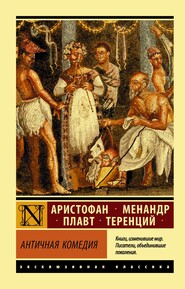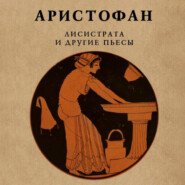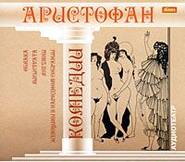По всем вопросам обращайтесь на: info@litportal.ru
(©) 2003-2024.
✖
The Eleven Comedies, Volume 1
Автор
Год написания книги
2018
Настройки чтения
Размер шрифта
Высота строк
Поля
DICAEOPOLIS. Peace! profane men![189 - A sacred formula, pronounced by the priest before offering the sacrifice ([Greek: kan_ephoria]).]
CHORUS. Silence all! Friends, do you hear the sacred formula? Here is he, whom we seek! This way, all! Get out of his way, surely he comes to offer an oblation.
DICAEOPOLIS. Peace, profane men! Let the basket-bearer[190 - The maiden who carried the basket filled with fruits at the Dionysia in honour of Bacchus.] come forward, and thou, Xanthias, hold the phallus well upright.[191 - The emblem of the fecundity of nature; it consisted of a representation, generally grotesquely exaggerated, of the male genital organs; the phallophori crowned with violets and ivy and their faces shaded with green foliage, sang improvised airs, called 'Phallics,' full of obscenity and suggestive 'double entendres.']
WIFE OF DICAEOPOLIS. Daughter, set down the basket and let us begin the sacrifice.
DAUGHTER OF DICAEOPOLIS. Mother, hand me the ladle, that I may spread the sauce on the cake.
DICAEOPOLIS. It is well! Oh, mighty Bacchus, it is with joy that, freed from military duty, I and all mine perform this solemn rite and offer thee this sacrifice; grant, that I may keep the rural Dionysia without hindrance and that this truce of thirty years may be propitious for me.
WIFE OF DICAEOPOLIS. Come, my child, carry the basket gracefully and with a grave, demure face. Happy he, who shall be your possessor and embrace you so firmly at dawn,[192 - The most propitious moment for Love's gambols, observes the scholiast.] that you belch wind like a weasel. Go forward, and have a care they don't snatch your jewels in the crowd.
DICAEOPOLIS. Xanthias, walk behind the basket-bearer and hold the phallus well erect; I will follow, singing the Phallic hymn; thou, wife, look on from the top of the terrace.[193 - Married women did not join in the processions.] Forward! Oh, Phales,[194 - The god of generation, worshipped in the form of a phallus.] companion of the orgies of Bacchus, night reveller, god of adultery, friend of young men, these past six[195 - A remark, which fixes the date of the production of the 'Acharnians,' viz. the sixth year of the Peloponnesian War, 426 B.C.] years I have not been able to invoke thee. With what joy I return to my farmstead, thanks to the truce I have concluded, freed from cares, from fighting and from Lamachuses![196 - Lamachus was an Athenian general, who figures later in this comedy.] How much sweeter, Phales, oh, Phales, is it to surprise Thratta, the pretty wood-maid, Strymodorus' slave, stealing wood from Mount Phelleus, to catch her under the arms, to throw her on the ground and possess her! Oh, Phales, Phales! If thou wilt drink and bemuse thyself with me, we will to-morrow consume some good dish in honour of the peace, and I will hang up my buckler over the smoking hearth.
CHORUS. It is he, he himself. Stone him, stone him, stone him, strike the wretch. All, all of you, pelt him, pelt him!
DICAEOPOLIS. What is this? By Heracles, you will smash my pot.[197 - At the rural Dionysia a pot of kitchen vegetables was borne in the procession along with other emblems.]
CHORUS. It is you that we are stoning, you miserable scoundrel.
DICAEOPOLIS. And for what sin, Acharnian Elders, tell me that!
CHORUS. You ask that, you impudent rascal, traitor to your country; you alone amongst us all have concluded a truce, and you dare to look us in the face!
DICAEOPOLIS. But you do not know why I have treated for peace. Listen!
CHORUS. Listen to you? No, no, you are about to die, we will annihilate you with our stones.
DICAEOPOLIS. But first of all, listen. Stop, my friends.
CHORUS. I will hear nothing; do not address me; I hate you more than I do Cleon,[198 - Cleon the Demagogue was a currier originally by trade. He was the sworn foe and particular detestation of the Knights or aristocratic party generally.] whom one day I shall flay to make sandals for the Knights. Listen to your long speeches, after you have treated with the Laconians! No, I will punish you.
DICAEOPOLIS. Friends, leave the Laconians out of debate and consider only whether I have not done well to conclude my truce.
CHORUS. Done well! when you have treated with a people who know neither gods, nor truth, nor faith.
DICAEOPOLIS. We attribute too much to the Laconians; as for myself, I know that they are not the cause of all our troubles.
CHORUS. Oh, indeed, rascal! You dare to use such language to me and then expect me to spare you!
DICAEOPOLIS. No, no, they are not the cause of all our troubles, and I who address you claim to be able to prove that they have much to complain of in us.
CHORUS. This passes endurance; my heart bounds with fury. Thus you dare to defend our enemies.
DICAEOPOLIS. Were my head on the block I would uphold what I say and rely on the approval of the people.
CHORUS. Comrades, let us hurl our stones and dye this fellow purple.
DICAEOPOLIS. What black fire-brand has inflamed your heart! You will not hear me? You really will not, Acharnians?
CHORUS. No, a thousand times, no.
DICAEOPOLIS. This is a hateful injustice.
CHORUS. May I die, if I listen.
DICAEOPOLIS. Nay, nay! have mercy, have mercy, Acharnians.
CHORUS. You shall die.
DICAEOPOLIS. Well, blood for blood! I will kill your dearest friend. I have here the hostages of Acharnae;[199 - That is, the baskets of charcoal.] I shall disembowel them.
CHORUS. Acharnians, what means this threat? Has he got one of our children in his house? What gives him such audacity?
DICAEOPOLIS. Stone me, if it please you; I shall avenge myself on this. (Shows a basket.) Let us see whether you have any love for your coals.
CHORUS. Great gods! this basket is our fellow-citizen. Stop, stop, in heaven's name!
DICAEOPOLIS. I shall dismember it despite your cries; I will listen to nothing.
CHORUS. How! will you kill this coal-basket, my beloved comrade?
DICAEOPOLIS. Just now, you did not listen to me.
CHORUS. Well, speak now, if you will; tell us, tell us you have a weakness for the Lacedaemonians. I consent to anything; never will I forsake this dear little basket.
DICAEOPOLIS. First, throw down your stones.
CHORUS. There! 'tis done. And you, do you put away your sword.
DICAEOPOLIS. Let me see that no stones remain concealed in your cloaks.
CHORUS. They are all on the ground; see how we shake our garments. Come, no haggling, lay down your sword; we threw away everything while crossing from one side of the stage to the other.[200 - The stage of the Greek theatre was much broader, and at the same time shallower, than in a modern playhouse.]
DICAEOPOLIS. What cries of anguish you would have uttered had these coals of Parnes[201 - A mountain in Attica, in the neighbourhood of Acharnae.] been dismembered, and yet it came very near it; had they perished, their death would have been due to the folly of their fellow-citizens. The poor basket was so frightened, look, it has shed a thick black dust over me, the same as a cuttle-fish does. What an irritable temper! You shout and throw stones, you will not hear my arguments—not even when I propose to speak in favour of the Lacedaemonians with my head on the block; and yet I cling to my life.
CHORUS. Well then, bring out a block before your door, scoundrel, and let us hear the good grounds you can give us; I am curious to know them. Now mind, as you proposed yourself, place your head on the block and speak.
DICAEOPOLIS. Here is the block; and, though I am but a very sorry speaker, I wish nevertheless to talk freely of the Lacedaemonians and without the protection of my buckler. Yet I have many reasons for fear. I know our rustics; they are delighted if some braggart comes, and rightly or wrongly loads both them and their city with praise and flattery; they do not see that such toad-eaters[202 - Orators in the pay of the enemy.] are traitors, who sell them for gain. As for the old men, I know their weakness; they only seek to overwhelm the accused with their votes.[203 - Satire on the Athenians' addiction to lawsuits.] Nor have I forgotten how Cleon treated me because of my comedy last year;[204 - 'The Babylonians.' Cleon had denounced Aristophanes to the senate for having scoffed at Athens before strangers, many of whom were present at the performance. The play is now lost.] he dragged me before the Senate and there he uttered endless slanders against me; 'twas a tempest of abuse, a deluge of lies. Through what a slough of mud he dragged me! I nigh perished. Permit me, therefore, before I speak, to dress in the manner most likely to draw pity.
CHORUS. What evasions, subterfuges and delays! Hold! here is the sombre helmet of Pluto with its thick bristling plume; Hieronymus[205 - A tragic poet; we know next to nothing of him or his works.] lends it to you; then open Sisyphus'[206 - Son of Aeolus, renowned in fable for his robberies, and for the tortures to which he was put by Pluto. He was cunning enough to break loose out of hell, but Hermes brought him back again.] bag of wiles; but hurry, hurry, pray, for our discussion does not admit of delay.
DICAEOPOLIS. The time has come for me to manifest my courage, so I will go and seek Euripides. Ho! slave, slave!
SLAVE. Who's there?
DICAEOPOLIS. Is Euripides at home?











